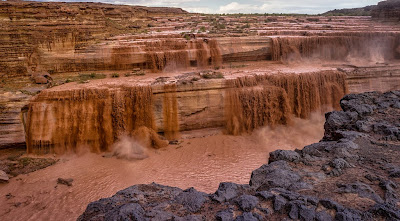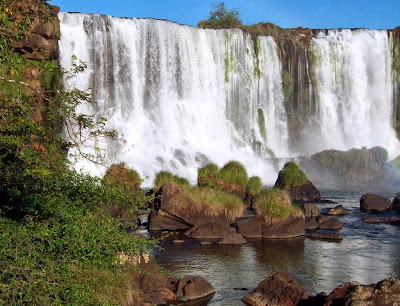 |
| Photo by: joiseyshowaa |
What is the right shutter speed for photographing waterfalls? This is one question most beginner photographers ask, what they are seeking is a speed that achieves the right amount of blur in the water which capture movement to make the shot interesting.
Well there is no such thing as a right shutter speed for photographing waterfalls, the shutter speed need to be set based on type of emotion you wish to evoke and the amount of blur needed to achieve it.
Let us first look into various emotions that a creative photographer can evoke in the minds of the viewers who look at the picture of a waterfall.
1. Fearsome
 |
| Photo by: Cedward Brice |
Very fast shutter speeds are used to completely freeze the motion of water. There is no blur in the water and it appears as if everything is frozen in a moment of time. This method is very effective in conveying the feeling of Turbulence, Action, and Danger etc associated with fast flowing water.
2. Frozen
 |
| Photo by: Stella Maris |
Moderately fast shutter speeds are used to freeze the motion of the water; however some blur is retained to emphasize movement. Waterfalls shot in bright lighting conditions using any of the semi- automatic / fully- automatic modes return such an effect 90% of the time.
3. Realistic
 |
| Photo by: Carl NC |
Here the photographer uses moderate amount of blur to convey the sense of motion in water, however special care is taken to make sure details in the water are not lost completely. The intended look is that of fluid motion that feels real and also conveys a sense of calm or peace. This is the way majority of waterfall images are made and it is achieved by using a moderately slow shutter speed.
4. Surrealistic
 |
| Photo by: Paul Bica |
Finally the photographer could take his imagery to a dreamy, surrealistic level by using very long shutter speeds to blur the water even more. When the moving water is blurred beyond a certain point it causes loss of detail in the water producing a romantic, peaceful image. Remember this is something that is very easy to overdo and when that happens the image suddenly feels unrealistic and lose its interestingness.
Now that we have discussed the various emotions that could be evoked by a picture of waterfalls, let us discuss how we can achieve each of those.
In order to achieve the feel; the photographer need to understand the relation between blur in an image and shutter speed. Only then he/she could make calculated decisions regarding the shutter speed required to generate the desired effect for any given waterfall.
There are five basic factors that determine the shutter speed for photographing a waterfall, they are:
The amount of blur required to create the desired effect
Based on the intended feel he/she wish to create; whether it is fierce, frozen, realistic or surrealistic, first determine the amount of blur required in a shot. The greater the blur required slower the shutter speed need to be and vice versa. The following factors also affect how the waterfall appears for a particular shutter speed.
Volume of water flowing
 |
| Photo by: Hudson Alves |
The greater the volume of water that is flows the shorter is the shutter duration required to blur is. This is a very simple concept, when more particles of water moves in front of the lens at any given shutter speed, each producing a certain amount of blur, the camera records more blur and so is able to blur the action with slower shutter speeds than when comparatively lesser volume of water is flowing.
Rate/Speed of water
 |
| Photo by: SF Brit |
It should be understood that not all waterfalls drop water at the same speed. Some waterfalls drop water straight down which will be fast while some other will have obstacles like rocks in the way of the water forcing the water to change direction and thus slow down. In general the farther the water drops fall the greater the speed. Slower waterfalls require slower speeds to attain the same amount of blur as a faster moving waterfall.
How far is the camera from the water?
 |
| Photo by: Ian Sane |
Objects that are closer to the sensor appear to move faster and vice versa. So if you move closer to the waterfall you will be able to get the same amount of blur with a faster the shutter speed than when you were farther from the fall.
The direction of water flow
 |
| Photo by: William Marlow |
The direction that the water is flowing with respect to the axis of the camera sensor affects the amount of blur recorded. Water that is flowing perpendicular to the axis of the lens will require a faster shutter-speed to produce a given amount of blur than water that is flowing directly at or away from the lens.
If these tips sound familiar you are right, all these directly relate to action photography and we have published an article earlier that discusses motion in much more detail. Do refer Understanding Action Photography to learn more about photographing moving subjects (that includes flowing water) lol.
Each waterfall is unique in features; they vary in heights, breadth, volume, speed, in the environment they exist et cetera. Depending upon seasons they change their appearance from fearsome or soft in appeal. An unknown waterfall in your neighborhood may sport some unique features you could project in your image. With some understanding of how much blur is required in our shot and what all are the factors that affect it let us find ourselves some pretty waterfalls to play with. Wish all; unique images from unknown waterfalls!
Post a Comment